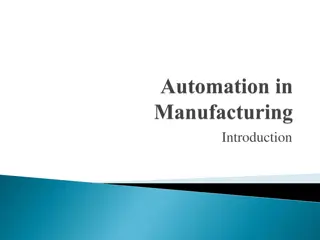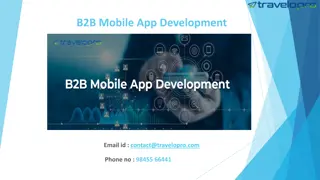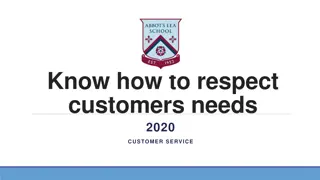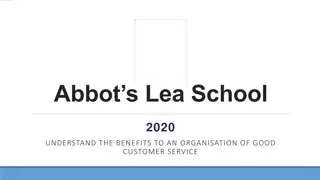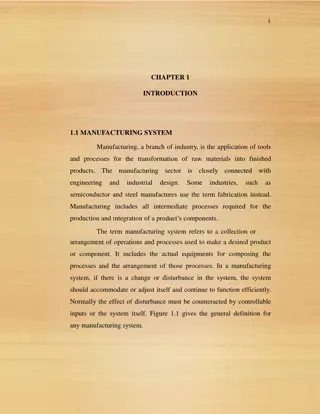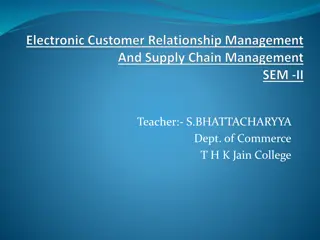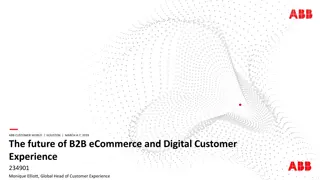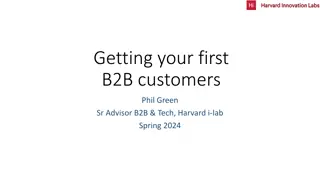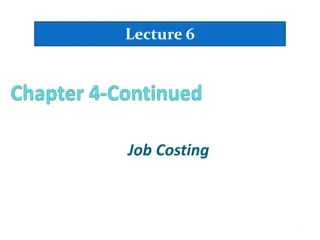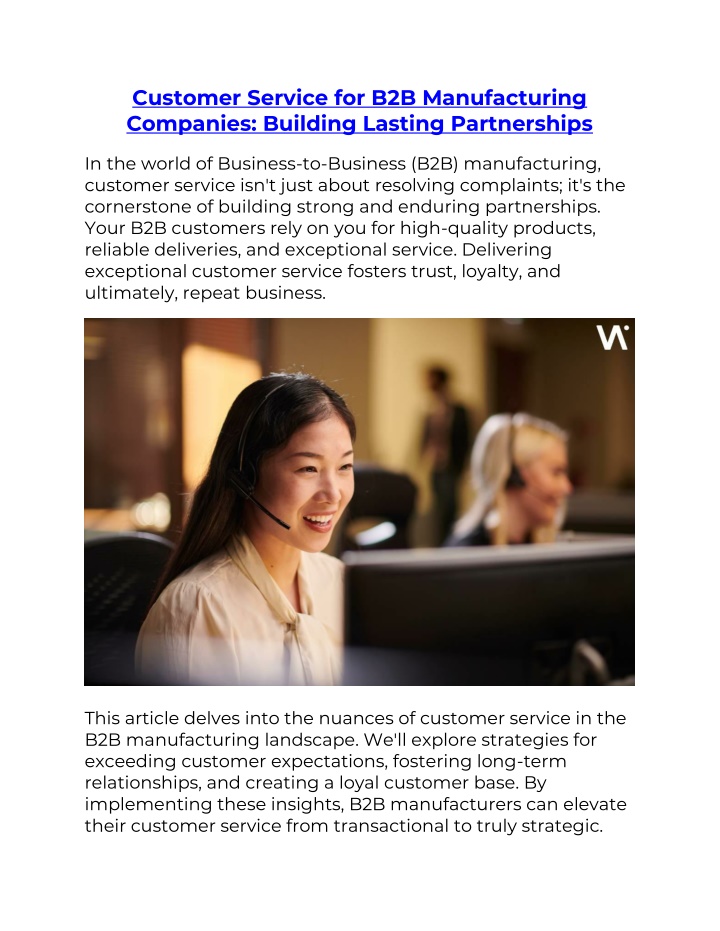
Customer Service for B2B Manufacturing Companies Building Lasting Partnerships
In the world of Business-to-Business (B2B) manufacturing, customer service isn't just about resolving complaints; it's the cornerstone of building strong and enduring partnerships. Your B2B customers rely on you for high-quality products, reliable de
Download Presentation

Please find below an Image/Link to download the presentation.
The content on the website is provided AS IS for your information and personal use only. It may not be sold, licensed, or shared on other websites without obtaining consent from the author. If you encounter any issues during the download, it is possible that the publisher has removed the file from their server.
You are allowed to download the files provided on this website for personal or commercial use, subject to the condition that they are used lawfully. All files are the property of their respective owners.
The content on the website is provided AS IS for your information and personal use only. It may not be sold, licensed, or shared on other websites without obtaining consent from the author.
E N D
Presentation Transcript
Customer Service for B2B Manufacturing Companies: Building Lasting Partnerships In the world of Business-to-Business (B2B) manufacturing, customer service isn't just about resolving complaints; it's the cornerstone of building strong and enduring partnerships. Your B2B customers rely on you for high-quality products, reliable deliveries, and exceptional service. Delivering exceptional customer service fosters trust, loyalty, and ultimately, repeat business. This article delves into the nuances of customer service in the B2B manufacturing landscape. We'll explore strategies for exceeding customer expectations, fostering long-term relationships, and creating a loyal customer base. By implementing these insights, B2B manufacturers can elevate their customer service from transactional to truly strategic.
Understanding B2B Customer Service Needs: B2B customer service needs differ from B2C interactions. Here's what sets B2B customer service apart: Complexities of Orders: B2B orders often involve technical specifications, large quantities, and specific delivery requirements. Long-Term Relationships: The success of a B2B manufacturing partnership hinges on trust and mutual benefit cultivated over time. Multiple Stakeholders: Decisions on choosing a supplier often involve multiple stakeholders within the customer's organization, each with their own needs and priorities. Technical Expertise: B2B manufacturing customers are knowledgeable about the products and processes involved. They expect technical expertise from their suppliers' customer service representatives. Financial Significance: Orders placed with B2B manufacturers can have significant financial implications for the customer. Prompt and reliable service is crucial. Building a Customer-Centric Culture: Exceptional customer service doesn't happen by accident. It requires building a customer-centric culture within your organization. Here's how: Leadership Commitment: Leadership commitment to customer service sets the tone for the entire organization. Ensure senior management champions customer-centric values. Employee Training: Invest in training customer service representatives (CSRs) on product knowledge, effective communication, and conflict resolution skills.
Data-Driven Approach: Track key customer service metrics like customer satisfaction scores and first- response times. Analyze data to identify areas for improvement. Empowerment: Empower CSRs to make decisions and resolve customer issues promptly without unnecessary bureaucratic hurdles. Strategies for Providing Exceptional B2B Customer Service: 1. Proactive Communication: Don't wait for customers to reach out with issues. Maintain regular communication, informing them of order updates, potential delays, and any relevant industry news that may impact them.
2. Technical Expertise: Your CSRs should possess a deep understanding of your products, manufacturing processes, and industry best practices. This allows them to answer technical questions confidently and offer valuable insights to customers. 3. Tailored Solutions: B2B customers have unique needs. Develop a service approach that goes beyond generic solutions. Work collaboratively with customers to understand their specific requirements and tailor your service accordingly. 4. Building Relationships: Customer service interactions serve as touchpoints for building lasting relationships. Go beyond transactional interactions. Get to know your customer contacts, understand their challenges, and demonstrate your commitment to their success. 5. Going the Extra Mile: Exceeding expectations builds loyalty and trust. Look for opportunities to go the extra mile. This could involve expediting an order to meet a critical deadline or offering technical support beyond standard business hours. Leveraging Technology for Improved B2B Customer Service:
Technology can be a powerful tool for enhancing your B2B customer service. Here are some ways to leverage it: Customer Relationship Management (CRM) Systems: Utilize CRM platforms to track customer interactions, purchase history, and communication preferences. Self-Service Portals: Develop a self-service portal where customers can access order tracking information, download product manuals, and submit inquiries online. Live Chat Features: Offer live chat features for real-time customer support on your website. Knowledge Base: Create a comprehensive knowledge base with FAQs, troubleshooting guides, and technical resources for customers to access readily. Building a Culture of Continuous Improvement:
Customer service excellence is an ongoing journey. Here's how to ensure continuous improvement: Feedback Mechanisms: Implement customer feedback mechanisms like surveys and online reviews to gather insights and identify areas for improvement. Internal Reviews: Conduct regular internal reviews of customer service performance based on data and feedback. Best Practice Sharing: Encourage a culture of knowledge sharing within your CSR team. Highlight successful customer interactions and best practices for others to learn from. The ROI of Exceptional B2B Customer Service: Investing in exceptional B2B customer service yields significant returns: Increased Customer Retention: Satisfied customers are more likely to remain loyal and place repeat orders. Reducing customer churn translates to increased revenue and predictable growth. Enhanced Brand Reputation: Positive customer experiences contribute to a positive brand reputation within the industry. This attracts new customers and strengthens your competitive advantage. Stronger Partnerships: Exceptional customer service fosters trust and collaboration with your B2B customers. This leads to stronger partnerships, joint problem- solving, and potential co-innovation opportunities. Improved Employee Engagement: When employees feel empowered to deliver outstanding customer service, it boosts morale and engagement within the organization.
Reduced Cost of Customer Acquisition: Retaining existing customers is significantly less expensive than acquiring new ones. Exceptional customer service reduces customer churn, minimizing acquisition costs. Conclusion: Building Lasting Partnerships Through Exceptional Service In the competitive world of B2B manufacturing, customer service isn't just an afterthought; it's a strategic differentiator. By prioritizing customer needs, building a customer-centric culture, and leveraging technology, B2B manufacturers can elevate their service from basic to exceptional. This fosters trust, loyalty, and long-lasting partnerships that fuel success in the B2B landscape. Remember, exceptional customer service isn't simply about resolving issues; it's about creating a positive and memorable customer experience at every touchpoint. By building strong relationships and exceeding expectations, B2B manufacturers can position themselves for sustainable growth and solidify their place as trusted partners in the industry.


